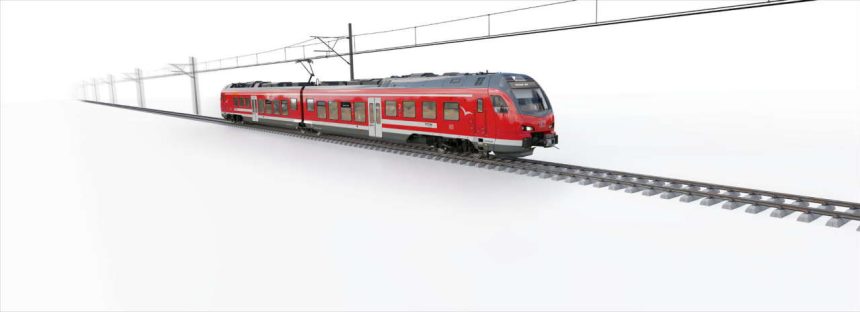Stadler is expanding its market lead in Germany in alternative propulsion with a third contract to supply battery-electric trains.
Over the next five years, Stadler will deliver at least 113 battery-electric vehicles for use on a route that was previously operated by diesel vehicles.
The trains will be introduced at the end of 2026 in the so-called H-network in Mecklenburg-Vorpommern, ‘H-network' stands for the use of electrical battery-hybrid vehicles. This means that these routes can be operated independently and completely emission-free, without the need to install catenaries throughout the entire network.
The two-car trains have a planned life of 13 years and are designed to meet the needs of the network, which runs along part of the Baltic Sea coast. Trains on the H-network Warnow cover 1.5 million train kilometres a year on the RB11 route between Wismar, Rostock, and Tessin, and the RB12 between Bad Doberan, Rostock, and Graal-Müritz.
The FLIRT Akkus have 99 seats and two spacious and accessible multi-purpose areas for wheelchairs, pushchairs, and bicycles. They are air-conditioned, step-free, have a wheelchair-accessible toilet, equipped with Wi-Fi, power sockets, CCTV, and a passenger information system.
FLIRT Akkus are battery-operated versions of Stadler's FLIRT trains. They have a range of about 100 km, which covers 80 percent of Germany's non-electrified routes. A FLIRT Akku holds the world record for the longest journey by a regional train in pure battery mode when it was driven 224km without additional charging.
The Akku concept is largely based on the already approved and tested pure electric FLIRTs, retaining most of the traction equipment and important mechanical components. They have a lightweight aluminium frame, and with maintenance-friendly designs and components, operating, energy, and servicing costs are kept to a minimum.
Jure Mikolčić, CEO of Stadler in Germany, said “With this new order for battery-operated vehicles from the Deutsche Bahn, we have further consolidated our market leadership in the field of alternative drives. Since 2019, Stadler has sold 113 vehicles with alternative drive technologies in Germany. It makes us very proud that our FLIRT Akku not only makes an ecological and innovative contribution to climate-friendly traffic policies, but also significantly boosts efficiency. If we consider the average life of a rail vehicle of around 30 years, battery-operated vehicles are more cost-effective than diesel-operated trains.”
Carsten Moll, Chairman of DB Regio Northeast, said “With the battery-electric multiple units, which will replace diesel vehicles, we are taking an important step towards climate neutrality with the state. As DB Regio, we are proud to put the first environmentally-friendly network of this type into operation in Mecklenburg-Western Pomerania.”

Stadler should build a train manufacturing plant somewhere in the UK and to continue on manufacturing more Flirts and Metro rolling stocks and to manufacture trains with batteries fitted to help de-carbonise our railways. And to replace and phase out older diesel units that the government wants to scrap by 2030.